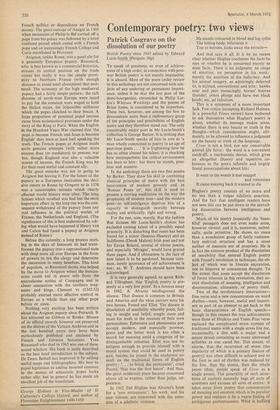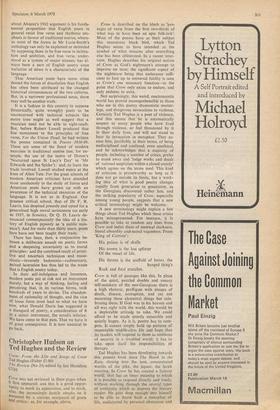Contemporary poetry: two views
Patrick Cosgrave on the dissolution of our poetry
To speak of greatness, or even of achieve- ment of a high order, in connection with post- war British poetry is not merely impossible; it is absurd. Most of the poets under review in this anthology are not concerned with sub- jects of any enduring or permanent import- ance, unless it be that the last post of the . demi-bourgeoisie, chronicled in Philip Lar- kin's Whitsun Weddings and the poems of Brian Jones, is considered to be important. These two, however, are among the few to demonstrate more than a rudimentary grasp of the principles and possibilities of English metre and they therefore stand out. The only conceivably major poet in Mr Lucie-Smith's collection is George Barker. It is striking that Mr Lucie-Smith speaks of him in awe as 'a man wholly committed to poetry in an age of part-time poets .. It is frightening how he has so often abused his talent; it is shocking how unsympathetic the critical environment has been to him : but there he stands, prec- ious and massive.
In the anthology there are two fine poems by Barker. They show his skill in combining classical principles of metre with the best innovations of modern prosody and, in 'Roman Poem iii', this skill is used to present a moving meditation on the way the propensity of modern man—and the modern poet—to self-indulgence deprives him of a capacity to distinguish morally between reality and artificially, right and wrong.
For the rest, note, merely, that the fashion that dictates Mr Lucie-Smith's choices has excluded coming talent of a possibly equal precocity. It is disturbing that room has been found for a minor (Seamus Heaney) and an indifferent (Derek Mahon) Irish poet and not for Eavan Boland, several of whose poems, and especially 'Mirages', would have graced these pages. And if obtuseness in the face of new talent is to be pardoned, because com- mon, surely ignorance of old achievement is not: so, W. T. Andrews should have been acknowleged.
It is very generally agreed, to quote Rich- ard Tillinghast, that 'English poetry is pre- sently at a very low point'. In a famous essay in 1962, A. Alvarez misdiagnosed the disease. That disease is common to Britain and America and the virus carriers were his two heroes, Pound and Eliot. The disease is dissolution ef sensibility whereby poets, fail- ing in insight and belief, sought more and more for truth in the recessed of their own personalities. Ephemera and phenomena pre- occupy modern, and especially postwar, poets and the better work is too often a search for meaning amid a congeries of in- distinguishable minutiae. Eliot was not in- telligent enough to provide himself with a moral system that could be used in poetry and, besides, he joined in the modernist as- sault on the traditional forms of English poetry : `. .. to break the pentameter', cried Pound, 'that was the first heave'. And thus, the great modernist poets became concerned above all to express, rather than judge, ex- perience.
In 1962 Ted Hughes was Alvarez's hope for a 'new seriousness': his work, and his new volume, are concerned with the asser- tion of a nihilistic violence, He stands trousered in blood and log-splits The lolling body, bifurcates it
Top to bottom, kicks away the entrails—
And that says it all. It is by no means clear whether Hughes condemns the facts he
sees or whether he is concerned merely to state facts. There is no judgment; no range of emotion; no perception in his work: merely the assertion of the bully-boy. And his animal imagery, so admiringly deferred to, is stylised, conventional and trite: hawks soar and peer menacingly; horses' hooves thunder; otters plunge and have wet black heads; etc, ad infinitum.
This is a symptom of a more important lack. Few critics (excepting Richard Holmes, in a powerful Times review) have bothered to ask themselves what Hughes's poetry is about, whether its message makes sense, whether there is any beauty or truth in the thought—which consideration ought, ulti- mately, to be allowed to influence a judgment on the beauty or truth of the language.
Crow is not a bird, nor any conceivable animal life force: the word is a convenient catch-all, a mechanistic device, which gives an altogether illusory and repetitive co- herence to the poet's infantile and largely foetal preoccupations about life:
It went to the womb it met maggot and rottenness It came weeping back it wanted to die Hughes's poetry consists of no more and no less than a vulgar nihilistic assertion. And the fact that intelligent readers have not seen this can be put down to the prevail- ing dissociation between intelligence and poetry.
Much of his poetry (especially the 'beaul tiful' passages) does not even make sense, however viewed; and it is, moreover, techni- cally, quite primitive. He shows no more than a nonchalant grasp of fairly rudimen- tary metrical structure and has a sense neither of measure nor of propriety. He is in fact the extreme product of the dissolution of sensibility that entered English poetry with Pound's revolution in technique, the ob- ject of which was to liberate expression, not to improve or concentrate thought. To the extent that poets accept the dissolution of forms inherent in this revolution, they ac- cept dissolution of meaning, intelligence and discrimination; ultimately, of poetry itself.
Two of the revolutionary innovations— free verse and a new concentration on word rhythm—were, however, useful and import-. ant as part of an attempt to get back to the basic characteristics of English speech— though in this respect the true achievements were those of Hopkins and Yeats. Free verse replaced the complicated stress systems of traditional metre with a single stress line (or, occasionally, a line with a major and a minor stress) containing as many unstressed syllables as one cared for. This meant, of course, that the recurrence of stress (the regularity of which is a primary feature of poetry) was often difficult to achieve and so the foot as unit of rhythm was replaced by the line, then the stanza, then the whole
poem (thus, people speak of Crow as a
single poem). The generality of such struc- tures of analysis naturally begs all sorts of questions and excuses all sorts of errors: it takes away from poetry that concentration of meaning and emotion which is its peculiar power and replaces it by a vague feeling of ambiguous portentousness. What is baffling about Alvarez's 1962 argument is his funda. mental proposition that English poets in general resist free verse and rhythmic ern- phasis in favour of traditional metres, where- as most of the forms in Mr Lucie-Smith's anthology can only be explained or defended by supposing them to be free verse in inclina- tion and ambition, and free verse, under- stood as a system of major stresses, has al- ways been a part of English poetry since variation of stress is a characteristic of the language.
That American poets have more often denied the forces of dissolution than English has often been attributed to the changed historical circumstances of the two cultures. But, in a narrower professional sense, there may well be another truth.
It is a fashion in this country to suppose (historically, quite wrongly) poets to be unconcerned with technical subjects like metre (one might as well suggest that a musician need not be able to sight-read)d But, before Robert Lowell produced that fine monument to the principles of free verse, For the Union Dead, he had written the poems contained in Poems 1938-49. These are some of the finest of modern exercises in traditional metres (see, for ex- ample, the use of the metre of Donne's 'Nocturnal upon St Lucy's Day' in 'Mr Edwards and the Spider'): and, to learn the trade involved, Lowell studied metre at the knee of Allen Tate. For the great schools of modern American criticism have attended most assiduously to the study of forms and American poets have grown up with an awareness of the teohnical resources of the language. It is not so in England. Our greatest critical school, that of Dr F. R. Leavis. has despised prosody and opted for a generalised high moral seriousness (as early as 1937, in Scrutiny, Dr Q. D. Leavis de- nounced contemptuously the idea of a his- tory of English prosody as 'a public nuis- ance'). And for more than thirty years, poets here have not been taught their trade.
There has been, then, a conjunction be- tween a deliberate assault on poetic forms and a deepening uncertainty as to moral principles: and the combined result of primi- tive and uncertain techniques and maso- chistic—inversely hedonistic—rudimentary, pained laceration has thus led to the waste that is English poetry today.
In their self-indulgence and looseness, Modern poets put at risk not an instrument merely, but a way of thinking, feeling and Perceiving that, in its various forms, took hundreds of years to devise. The abandon- ment of rationality of thought, and the vice of loose form must lead to what we have now, what Donald Davie has suggested is a disregard of poetry, a consideration of it as a minor instrument, the novel's inferior. We have come to that pass. That we have is Of great consequence. It is now essential to go back.



































 Previous page
Previous page